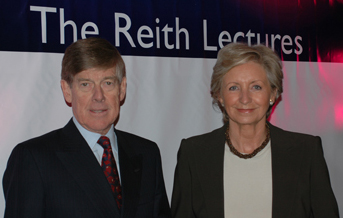Last night, Lord Broers gave the second lecture in the BBC's prestigious Reith lecture series at the Department of Engineering in Cambridge.

Lord Broers chose this venue, because it represents home turf. He studied and conducted his first research in the Department of Engineering. He later returned to be the Professor of Electrical Engineering in the Department (1984-96) and then the Head of Department (1993-96), before becoming the University's Vice Chancellor (1996-2003).
In the five lectures, entitled 'The Triumph of Technology', he sets out his belief that technology can and should hold the key to the future. In the Cambridge lecture, Lord Broers showed how collaboration lies at the centre of technological innovation by insightful references to a series of examples. He explained that the era has passed when individuals could achieve significant advances while working in isolation. Technology research needs team work to engage the full spectrum of expertise and if breakthroughs are to be achieved then very often these teams must be international.
This lecture was delivered to an invited audience of over 300 in the Department of Engineering's main lecture theatre and relayed to a neighbouring lecture theatre, which was packed with Department staff and students. It was also transmitted live to the Massachusetts Institute of Technology and recorded by the BBC for later broadcast on Radio 4. The series will be broadcast on BBC Radio 4 every Wednesday from 6 April to 4 May at 8.00pm. The Cambridge lecture will be broadcast on 13 April.
Lord Broers was succeeded by Professor David Newland, and then by Professor Keith Glover as Head of the Department of Engineering. Professor Glover published the Department's new strategy last year, which features three major themes: engineering for life sciences; cognitive systems engineering; and sustainable development. Implementation of this strategy is well underway. It includes the creation of the Centre for Advanced Photonics and Electronics (CAPE), which embodies the Electrical Engineering Division. Professor Bill Milne, the Director of CAPE, has worked with his colleagues to secure substantial funding from the Government for the new laboratory on the West Cambridge Site, strategic partners from industry, and an exciting portfolio of research projects. CAPE is already up and running. It will move into its new building at the beginning of 2006.

